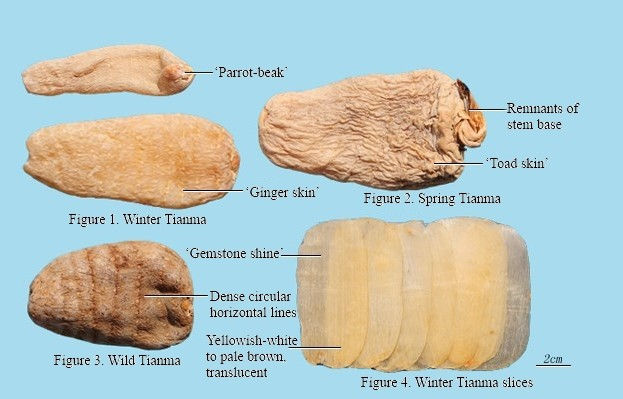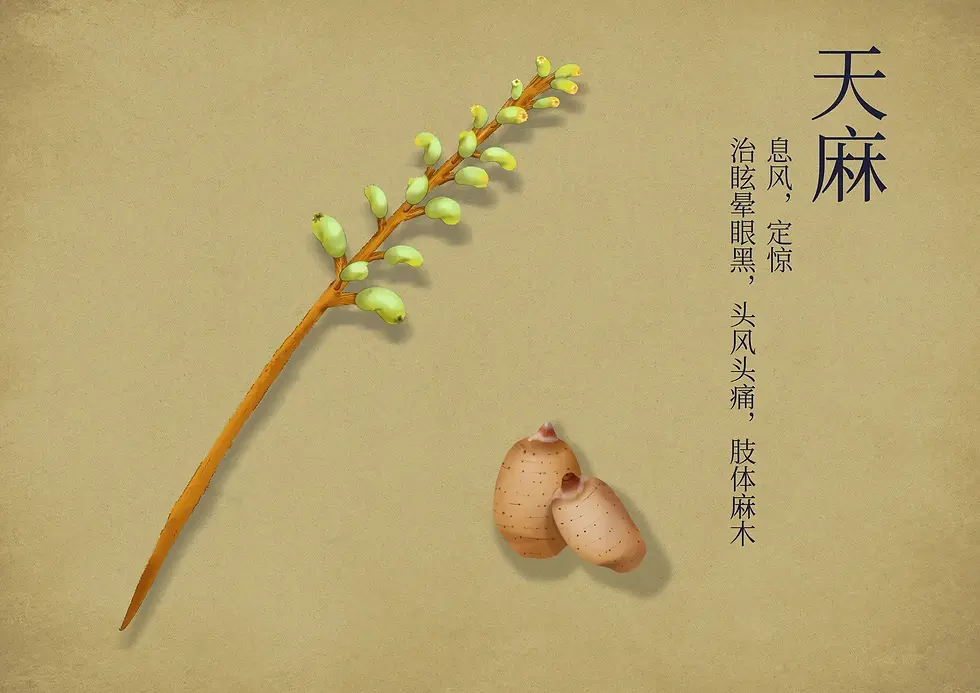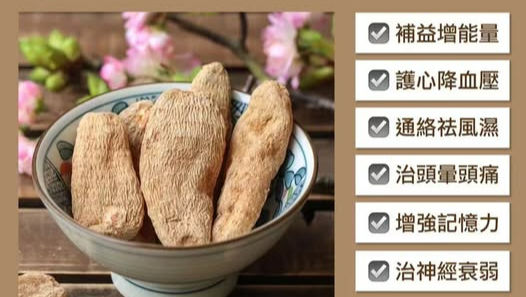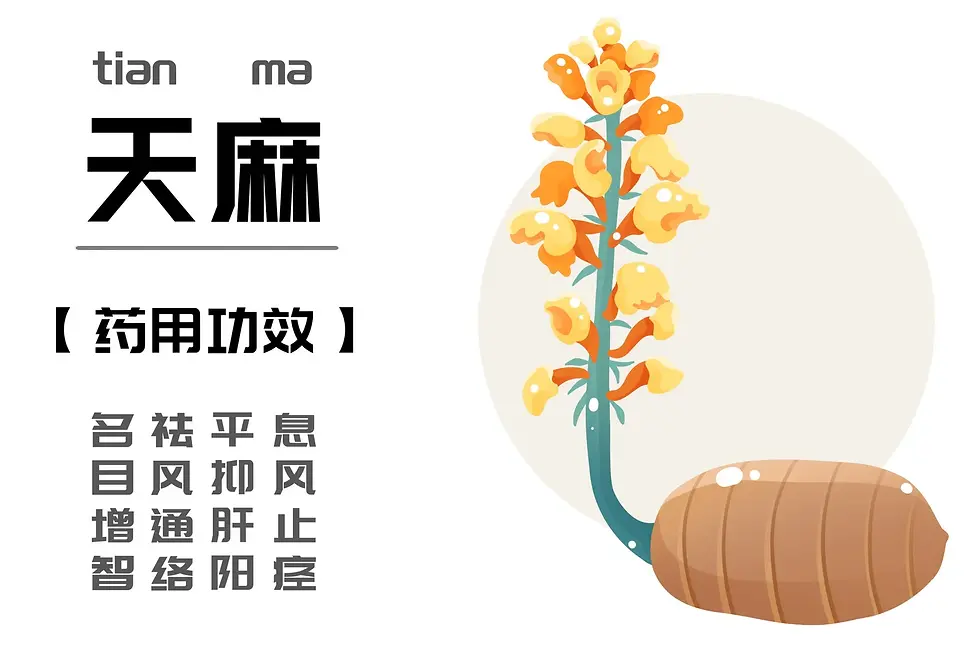Tian Ma: The TCM Herb for Calming Wind and Relieving Dizziness
- Hongji Medical

- Jun 27, 2025
- 4 min read
Tian Ma, also known as Gastrodia tuber or Heavenly Hemp, is the dried rhizome of the orchid plant Gastrodia elata, widely used in Traditional Chinese Medicine (TCM). It is prized for its ability to calm internal wind, subdue liver yang, and treat conditions like headaches, dizziness, and seizures. Its name, meaning "heavenly hemp," reflects its calming and stabilizing effects.
Tian Ma was first recorded in the Shennong Bencao Jing (Shennong’s Classic of Materia Medica) as a top-grade herb, noted for dispelling harmful energies, boosting vitality, and promoting longevity.
The Mingyi Bielu expanded on its uses for treating wind-related disorders, seizures, and childhood convulsions. Li Shizhen’s Compendium of Materia Medica described its unique appearance—resembling a string of beads with reddish shoots—and highlighted its effectiveness for dizziness, paralysis, and pediatric seizures. The Yaoxing Fu succinctly praised its ability to calm wind and resolve dizziness, cementing its role in TCM.

Properties of Tian Ma
Nature and Channels
Taste: Sweet
Nature: Neutral
Channel: Liver
Main Benefits
Calms internal wind and stops spasms
Subdues liver yang to relieve dizziness
Dispels wind and unblocks channels
Promotes sedation and calmness
Dosage
Internal use: 9–30 grams, boiled in decoctions.
Growing Regions and Harvest
Found in Southwest, Northwest, and Central China, including Yunnan, Guizhou, Sichuan, and Shaanxi. Harvested in winter or early spring, cleaned, steamed, and dried.
Identification
Shape: Elliptical or elongated, flattened, 3–5 cm long, 1.5–6 cm wide, 0.5–2 cm thick.
Color: Yellowish-white to light yellowish-brown with longitudinal wrinkles and faint ring marks.
Features: One end has a reddish-brown bud residue (“parrot’s beak”); the other a round navel-like scar (“navel eye”).
Texture: Hard, difficult to break, with a horny, yellowish-white cross-section.
Scent and Taste: Mild scent, slightly sweet.
Preparation
Raw: Used directly.
Steamed: Milder, enhances nourishing effects.

Clinical Uses of Tian Ma
Tian Ma is used in TCM to treat various conditions:
Headache and Dizziness: Relieves severe or intermittent headaches, vertigo, blurred vision, and nausea from liver yang hyperactivity or wind-phlegm.
Limb Numbness: Eases reduced sensation or impaired movement in limbs due to blood deficiency or blocked channels.
Pediatric Convulsions: Treats fever-induced seizures, twitching, or coma in children from external pathogens or internal heat.
Epilepsy: Manages sudden fainting, clenched jaw, stiff limbs, or frequent seizures from phlegm-fire or internal wind.
Facial Nerve Spasms: Reduces involuntary facial muscle twitching.
Ménière’s Syndrome: Alleviates vertigo, tinnitus, and hearing loss.

Specific Benefits
Calming Internal Wind and Stopping Spasms: Tian Ma’s gastrodin reduces nervous excitability, easing convulsions and numbness.
Subduing Liver Yang: It calms excessive liver yang, relieving headaches and dizziness.
Dispelling Wind and Unblocking Channels: It improves circulation to reduce numbness and pain.
Promoting Sedation: It aids sleep and reduces anxiety.
Tian Ma in TCM Formulas
Tian Ma is often combined with other herbs in TCM formulas to enhance its effects. Here are some examples:
Tian Ma Gou Teng Yin (Gastrodia and Uncaria Decoction): Combines Tian Ma with Uncaria, Abalone Shell, Gardenia, Scutellaria, Cyathula, Eucommia, Leonurus, Polygonum Vine, and Poria to calm liver wind and clear heat, treating dizziness and insomnia.
Ban Xia Bai Zhu Tian Ma Tang (Pinellia, Atractylodes, and Gastrodia Decoction): Includes Tian Ma with Pinellia, Atractylodes, Poria, Tangerine Peel, Licorice, Ginger, and Jujube to dry dampness and clear wind-phlegm, relieving dizziness and nausea.
Ling Jiao Gou Teng Tang (Antelope Horn and Uncaria Decoction): Often uses Tian Ma instead of antelope horn (for cost and conservation) with Uncaria, Mulberry Leaf, Chrysanthemum, Rehmannia, Peony, Fritillaria, Poria, Bamboo, and Licorice to clear heat and stop spasms.
Comparison with Similar Herbs
Tian Ma shares effects with other TCM herbs but has distinct strengths:
Uncaria (Gou Teng): Clears heat and calms wind, stronger for heat-induced seizures but weaker at unblocking channels.
Abalone Shell (Shi Jue Ming): Subdues liver yang and clears eye conditions, stronger for calming yang but weaker for stopping spasms.
Antelope Horn (Ling Yang Jiao): Clears heat, calms wind, and sedates, more potent for acute seizures but less versatile and used mainly in emergencies.
Tian Ma excels in calming wind, stopping spasms, and relieving numbness.
Modern Applications and Research
Modern research highlights Tian Ma’s benefits:
Sedative and Hypnotic: Gastrodin suppresses central nervous system activity, improving sleep.
Anti-Convulsant: Reduces brain excitability, aiding seizure control.
Pain Relief: Eases headaches and nerve pain.
Improved Brain Circulation: Enhances blood flow, benefiting dizziness.
Antioxidant: Protects neurons and slows aging.
Clinical Uses
Neurological Disorders: Treats migraines, epilepsy, and cerebral insufficiency.
Cardiovascular Health: Supports hypertension and atherosclerosis management.
Cognitive Decline: May improve memory in early dementia.
Musculoskeletal Pain: Relieves discomfort from cervical or lumbar issues.

How to Use Tian Ma Safely
Precautions
Yin or Blood Deficiency: Avoid use, as its drying nature may worsen symptoms.
Heat Conditions: Use cautiously, as its neutral nature may aggravate heat.
Pregnancy: Avoid, especially with a history of miscarriage, due to its blood-activating effects.
Drug Interactions: Do not use with Veratrum (Li Lu), as per TCM contraindications.
Liver or Kidney Deficiency: Use cautiously in those with qi or blood insufficiency.
Usage Tips
Steamed Tian Ma is gentler and more nourishing. Consult a TCM practitioner for proper dosage and suitability, and ensure high-quality sourcing for optimal efficacy.
Conclusion
Tian Ma is a versatile TCM herb known for calming internal wind, subduing liver yang, and relieving dizziness, numbness, and seizures. It effectively treats headaches, epilepsy, and pediatric convulsions, with modern research supporting its sedative, anti-convulsant, and neuroprotective effects. To ensure safe and effective use, consult a TCM practitioner, especially for those with yin deficiency, heat conditions, or pregnancy, and choose high-quality Tian Ma from reputable sources.




